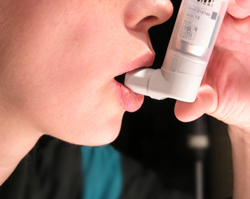Interleukins for treating asthma
Asthma is an allergic respiratory disease, affecting over 30 million European citizens. Although disease symptoms and severity vary, the overall health care costs mount to billions of euros per year. Additional costs to the European economy also accrue due to loss of productivity and absenteeism from work. The aim of the EU-funded 'Novel Interleukins for immunotherapy of asthma' (NILTHERA) was to evaluate the role of interleukins-28/29 in the development of allergic airway inflammation. Project scientists used mice that had a deletion in the IL-28 receptor and studied the effect of endogenous signalling on T cell differentiation. IL-28 cytokines proved to be critical for driving cytotoxic CD8+ T cell differentiation in the expense of CD4+ effector T cells. As a result, IL-28R knockout mice developed allergic airway inflammation and hyper-responsiveness to allergens associated with increased CD4+ T cell responses. Also, when scientists treated wild-type mice with IL-28 cytokine, they observed a suppression of CD4+ T cells and a reduction of respiratory inflammation. The effect of IL-28 on T cells was found to be mediated through dendritic cells, the professional antigen-presenting cells of the immune system. In their attempt to delineate the underlying mechanism of IL-28 activity, researchers discovered that IL-28 affected a number of molecular pathways that determine dendritic cell function. In order to study the biology of IL-28 cytokines in vivo and map where and when they are being expressed, NILTHERA scientists generated a transgenic mouse model where IL-28 fluoresced. This model has great potential for screening existing and novel agonists of IL-28 as treatment for asthma. Taken together, the results of the NILTHERA study indicate that treatment with IL-28 could alleviate the symptoms of asthma, thereby improving the quality of life of asthma sufferers.







